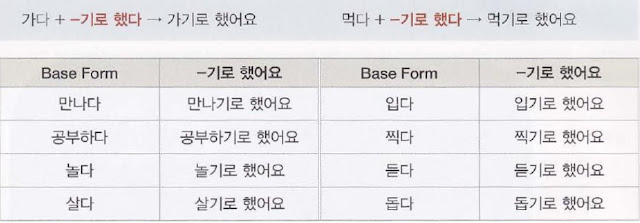건강 때문에 올해부터 담배를 끊기로 했어요.
I made the decision to stop smoking for my health starting this year.
주말에 친구하고 같이 등산하기로 했어요.
I decided to go hiking with my friend over the weekend.
우리는 3년 후에 결혼하기로 했습니다.
We’ve decided to get married three years from now.
Grammar Focus:
1. -기로 하다 expresses the making of a promise with another person and is made by adding -기로 to the verb stem.
A: 정아 씨, 사랑해요. 우리 내년에 결혼합시다.
Jeonga, I love you. Let’s get married next year.
B: 좋아요. 내년에 결혼해요. Okay. Let’s get married next year.
->정아 씨와 나는 서로 사랑하고 있어요. 우리는 내년에 결혼하기로 했어요.
Jeonga and I love each other. We decided to get married next year.
2. -기로 하다 can also express the making of a promise with oneself. That is, it can express a decision or resolution to do something. It is made by adding -기로 했다 to the verb stem.
• 나는 올해부터 매일 운동하기로 했어요.
I resolved to exercise every day starting this year.
 Conversation:
Conversation:
A: 재준 씨, 오늘 왜 이렇게 기분이 좋아요?
Jaejun, why are you in such a good mood today?
B: 이번 주말에 캐럴 씨와 데이트하기로 했어요.
Carol and I have decided to go on a date this weekend.
A: 내일 등산 갈때 누가 카메라를 가져와요?
Who will bring the camera tomorrow when we go hiking?
B: 부디 씨가 가져오기로 했어요.
Budi decided to bring one.
A: 새해에 무슨 계획이 있어요?
What plans do you have for the new year?
B: 새해에는 자기 전에 꼭 일기를 쓰기로 했어요.
I’ve decided to write in my journal every day before going to sleep.
Notes:
While -기로 하다 is mainly used in its past tense forms of -기로 했어요/했습니다, it is sometimes used in its present tense form of -기로 해요. In such cases, it refers to the speaker and listener making a promise to do something.
A: 내일 뭐 할까요? What shall we do tomorrow?
B: 등산하기로 해요. ( = 등산하기로 합시다.) Let’s (decide to) go hiking.
